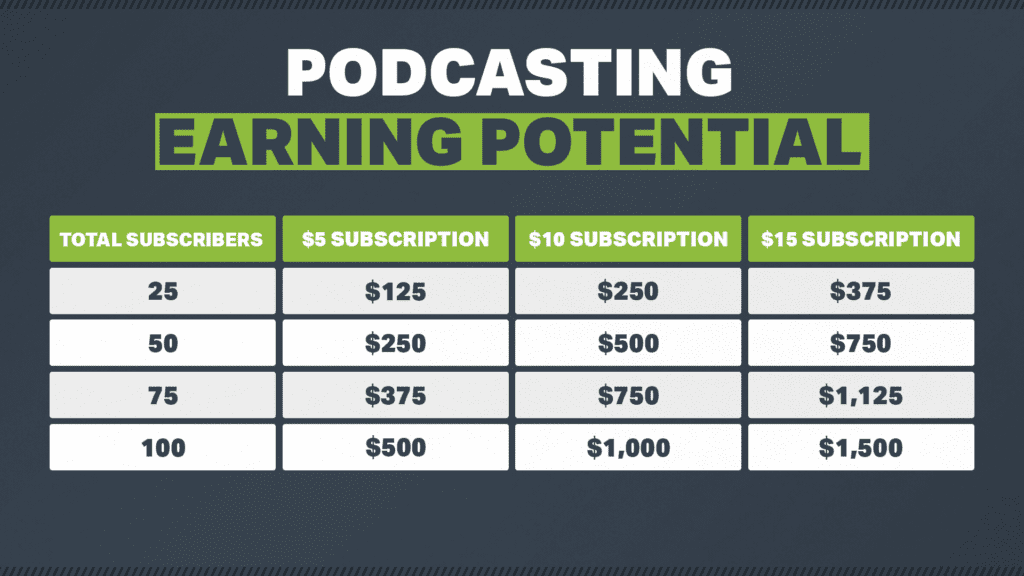Podcasts are becoming a very popular way for athletes, media, and any creator to reach an audience. According to Edison Research, 32% of Americans listen to podcasts at least once a month. With accessible avenues to distribute and consume, the medium is incredibly simple to support and monetize.
Before we dive into the how-to’s of starting and monetizing a podcast, let’s take a look at the opportunities a podcast holds for athletes. Despite podcasts being free to listen to, many ask their listeners to subscribe to support their efforts. Based on various monthly subscription rates and how many supporters a podcast has, here is a breakdown of potential monthly earnings.

Revenue potential from podcasting goes beyond supporter subscriptions. Many podcasts have paid advertisements in the intro, middle, or outro of the recording. Rates for these ads will vary depending on your podcast’s audience size, demographic, and interests. Podcasters should connect with brands, and find which one is the best fit for your topics.
To achieve success, most podcasts require extreme consistency over a long period of time. Having a plan is crucial to keep this revenue stream going. Pick a theme, topics of focus, and routine time commitment (daily, weekly etc.) to set expectations for yourself and supporters from the start.
As an athlete, time is one of your most valuable assets. Budget the amount of time you need to produce and publish your podcast each week. Most podcast episodes run anywhere from 15 minutes to over an hour. Budget at least an hour of time to record each episode, which for most podcasts, are published on a weekly or bi-weekly basis. Editing can take the bulk of the time, so plan around 2 hours to edit each episode. Lastly, you will need to upload the episode to a distribution channel like Anchor and write a description for the episode. To gain listeners take time to share and promote the episode on your social media channels and encourage any podcast guests, and even listeners, to do the same.
Weekly time commitment, in short:
- 1 hour: preparing and researching questions
- 1 hour: recording
- 2 hours: editing
- 1 hour: uploading and promoting
Budget about 5 hours per week or up to 20 hours per month to dedicate to your podcast. To save on time, you can always pay to outsource editing to a freelancer if needed.
Great, podcasting fits your schedule and it’s something you want to do consistently. The next step for a successful podcast is acquiring the right tools.
Tools for Effective Podcasting:
Microphone
There are thousands of microphone options on the market, you can do your own research to find the right one. However, you don’t need a fancy microphone to get started. Using your earbud microphone is suitable and requires less set up.
Recording
An easy method to record, especially if you have guests, is with Zoom. Just ensure that you’re recording the conversation and it is saving to the right place. Zoom makes it easy to have multiple people on the recording and many people now know how to use the tool. Zoom will save both a video (mp4) and audio only file to make it easy to edit.
Editing
Similar to microphones, there are thousands of editing tools out there. Do your research and find what works best for you. If you have a Mac computer, Garage Band and iMovie are two easy and free tools to edit and export audio. Windows has similar products like Windows Movie Maker and Magix Music Maker.
Distribution
Again, there are many different distribution platforms. For many podcasters, Anchor is the easiest way to get podcast episodes distributed to major platforms like Apple Podcasts and Spotify. Anchor has an easy page where supporters can contribute monthly to your show and also provides in-depth audience analytics.
Promotion
Let all your channels know that you’re hosting and publishing a podcast. Your followers are a built-in support system. Create conversation and ask questions to encourage supporters to share about the podcast and create hype around each episode. Be sure to encourage your audience to subscribe during the episode, many podcasts have a call to action for their audience in the beginning, middle, or end of the recording.
Athlete Examples
Here are examples of athelte-driven podcasts to gain inspiration.
Disclosure
Be sure to disclose all payment activities to your institution or governing body to remain compliant and eligible in your sport.




